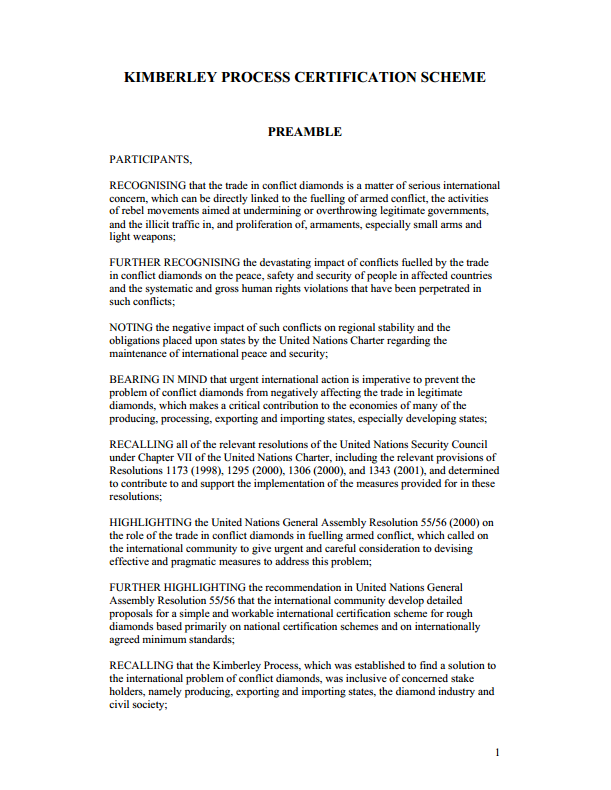United in eradicating
Conflict Diamonds
Uniting governments, civil society and the wider industry, the Kimberley Process (KP) defines conflict diamonds as: ‘rough diamonds used to finance wars against governments’ - around the world.
Kimberley Process Certification Scheme (KPCS)
The KP unites 85 countries around the world (including all members of the European Union - which stands as one nation)
The KP unites 59 member countries around the world (including the European Union – which stands as one nation)
In 2003 a number of working groups and committees were formed to ensure and to maintain the KPCS programs.
The Civil Society Coalition is an observer of the Kimberley process and is made up of 13 members
KP members are responsible for stemming 99.8% of the global production of conflict diamonds.
How the Kimberley Process
Works
The Kimberley Process (KP) is a multilateral trade regime established in 2003 with the goal of preventing the flow of conflict diamonds. The core of this regime is the Kimberley Process Certification Scheme (KPCS) under which States implement safeguards on shipments of rough diamonds and certify them as “conflict free".
Under the terms of the KPCS participants must:

Satisfy ‘minimum requirements’ and establish national legislation, institutions and import/export controls

Commit to transparent practices and to the exchange of critical statistical data

Trade only with fellow members who also satisfy the fundamentals of the agreement

Certify shipments as conflict-free and provide the supporting certification
2019 Statistics
$13,574,417,964.86
the total value of diamonds traded
through the KPCS

Stronger Together
Open Arms
The Kimberley Process welcomes all countries who are willing and able to implement its minimal requirements.
Active Involvement
Participating members, civil society observers and the wider industry meet twice yearly – at intersessional and plenary meetings – and conduct monthly teleconferences.
United for Change
Adherence and implementation is monitored through ‘review visits’, regular exchange of data, statistical analysis and the annual reports.
-

Working groups
In 2003 a number of working groups and committees were formed to ensure and to maintain the KPCS programs.
-

Civil society coalition
The Civil Society Coalition is an observer of the Kimberley process and complements the tripartite structure of the KP. As the third pillar it reflects the perspective of good governance and global sustainability with a specific attention for the various problems related to the diamond mining in Africa.
-

Chair
The chair oversees the implementation of The Kimberley Process Certification Scheme (KPCS) and operations of the working groups, committees and administration that activate The KP.
-

Observers
The term ‘Observer’ refers to Industry and Civil Society groups that perform an active role in monitoring and establishing the effectiveness of the Kimberley Process Certification Scheme.
-

Participants
The Kimberley Process (KP) is open to all countries that are willing and able to implement its requirements.
-

Vice Chair
The Vice Chair is selected at the annual 'plenary' meeting and becomes Chair automatically the following year.
-

Candidates
Candidates for the Kimberley Process are the countries, who have expressed their commitment to the KP but are yet to meet the minimum requirements of the KPCS.
-

Working groups
In 2003 a number of working groups and committees were formed to ensure and to maintain the KPCS programs.
-

Civil society coalition
The Civil Society Coalition is an observer of the Kimberley process and complements the tripartite structure of the KP. As the third pillar it reflects the perspective of good governance and global sustainability with a specific attention for the various problems related to the diamond mining in Africa.
-

Chair
The chair oversees the implementation of The Kimberley Process Certification Scheme (KPCS) and operations of the working groups, committees and administration that activate The KP.
-

Observers
The term ‘Observer’ refers to Industry and Civil Society groups that perform an active role in monitoring and establishing the effectiveness of the Kimberley Process Certification Scheme.
-

Participants
The Kimberley Process (KP) is open to all countries that are willing and able to implement its requirements.
-

Vice Chair
The Vice Chair is selected at the annual 'plenary' meeting and becomes Chair automatically the following year.
-

Candidates
Candidates for the Kimberley Process are the countries, who have expressed their commitment to the KP but are yet to meet the minimum requirements of the KPCS.
The Kimberley Process
FAQS
History
The Kimberley Process started when Southern African diamond-producing states met in Kimberley, South Africa, in May 2000, to discuss ways to stop the trade in ‘conflict diamonds’ and ensure that diamond purchases were not financing violence by rebel movements and their allies seeking to undermine legitimate governments.
2000
The Kimberley Process began in May 2000, in Kimberley South Africa. The item was included in the agenda of the 55th session of the UN General Assembly. Diamond-producing states concerned by the damaging social effects of the trade in ‘conflict diamonds’ set out to agree a framework for reducing these influences.

2002
In November 2002, after 2 years of negotiations the Kimberley Process Certification Scheme (KPCS) was launched and signed by 37 countries in Interlaken, Switzerland.

2003
The KPCS entered into force in 2003, when participating countries started to implement its rules.

2010
Under the terms of the KPCS, participating states must meet 'minimum requirements' and must put in place national legislation and institutions; export, import and internal controls; and also commit to transparency and the exchange of statistical data. Participants can only legally trade with other participants who have also met the minimum requirements of the scheme, and international shipments of rough diamonds must be accompanied by a KP certificate guaranteeing that they are conflict-free.

2012
Cameroon, Kazakhstan, Panama and Cambodia joined the Kimberley Process.

2013
Administrative Support Mechanism was established to assist the Kimberley Process Chair and Working Groups in implementation of the KPCS.

2016
The Kimberley Process hosted 3 KP Chair Special Forums on Rough Diamond Valuation to address the issue of undervaluation of rough diamonds.

United in
Making the Difference
With so many of today’s challenges impacting humanity at the global scale, The Kimberley Process maintains a stringent focus.
Uniting countries, industry and civil societies to better lives and communities the world over.
Today, The KP is responsible for stemming 99.8% of the tide in conflict diamonds.
The KPCS is helping to shape and support a transparent global diamond trade.

